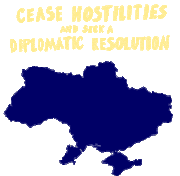|
trucutru posted:His was a rational speech that explained why the US had to get out. But, at the same time, he put all the blame of the fall on the afgahns which is both not true and a lovely thing to do to your supposed allies. From The American Conservative regarding Bidenís speech: quote:Cue the screeching about how Biden supposedly blamed the Afghan people for their predicament. Yet is there anything in there that isnít true? The Afghan army did collapse like matchsticks. A lack of will does appear to be the reason. And there is nothing to indicate that a year or 20 from now the armed forces will be any less enfeebled, or the government any less corrupt, or the Taliban any less determined. At Last, A Presidential Case For Restraint nelson fucked around with this message at 20:07 on Aug 17, 2021 |
|
|
|

|
| # ? Jun 9, 2024 13:49 |
|
trucutru posted:His was a rational speech that explained why the US had to get out. But, at the same time, he put all the blame of the fall on the afgahns which is both not true and a lovely thing to do to your supposed allies. I remember when I was a kid in 2002 I asked my mom whether it was good that the US invaded Afghanistan, and she said no, Americans are completely unreliable, they are just going to get impatient one day, gently caress off, and then blame the Afghans when they were the ones who were responsible in the first place, just like they did with us and Vietnam. My uncle got sent to a re-education camp after 1975, spent 5 years there, eventually made his way to the U.S. That dude is the toughest SOB I've ever known, he survived 5 years of hard manual labor and eating rice everyday, but according to some Americans the Vietnam War was lost because South Vietnam lost the will to fight. Would like to see how some of these people now making GBS threads on the ANA would do if they were in in their circumstance, when your so-called ally withdraws all air and military support, abandons the country, and they tell you to hang on and keep morale while you see the rest of your country falling in rapid succession. Then they blame you for it. quote:Anything you want the American public to know? https://www.thebulwark.com/please-dont-leave-us-behind-we-will-be-great-americans/ JesusSinfulHands fucked around with this message at 20:14 on Aug 17, 2021 |
|
|
|
I've been saying "collaborators" in reference to the Afghans who helped the US over the last 20 years, and I do not intend any negative connotation to that in any way whatsoever. Those people put their lives on the line for us, and for the hope of a better future for themselves and their families (and daughters especially). We owe them that future, in the United States now since we failed utterly at creating it in Afghanistan. They're good people and they've earned what they're owed.
|
|
|
|
I think a lot of people probably apply the word "collaborator" with the same intent as they would to describe a fellow person they're working with, for say school work, their job, etc. So if someone says that the US should get collaborators out, and in general they're referring to people who simply worked with the US, like you said, because that provided money or food, etc., and for themselves and family, then yeah, that's perfectly reasonable. But "collaborator" can also carry with it the negative connotations in terms of assisting an enemy actively and willingly against one's own people, country, etc., without underlying defensible reasons such as above. And so it's usually meant to demean and disparage a person when taken the term is applied this way. And I don't doubt that there were quite a few individuals like this in Afghanistan. The way the term was used, in terms of assisting Americans and turning on family/friends/etc., to benefit "masters", definitely makes it clear that it was the definition with negative connotations that was being used. And maybe it's fair, maybe it isn't, but it just seems very prejudicial, especially coming from someone who should know better.
|
|
|
|
I think collaborator is a pretty accurate and neutral term for someone who works with an invading, occupying force. There are far more negative terms that could be used, like traitor. It's just kind of hard to see it that way, because of the common association of that term with people who collaborated with the nazis. The nazis were obviously the bad guys, and America is obviously the good guys, or at least not as bad as the nazis.
|
|
|
|
I've just assumed that the various folks using the term collaborator are doing so pejoratively. Partner, national, or allied forces have always been the preferred terms. While we're at it, people really should know the difference between Afghan and Afghani after 20 years of conflict.
|
|
|
|
OctaMurk posted:A big part of the reason the Army was starving and unpaid is because the Afghan leaders stole their money and materiel. And yes, it is our fault for enabling thieves. But the thieves are also to blame for being thieves. like i mean we set up the whole scheme, it's us at the root of it if a brazenly corrupt and inept kleptocracy exists and has not fallen solely because we're shoring up their foundation and keeping them from suffering the natural consequences of their theft of vital assets and mismanagement of critical, core functions of a nation, we're to blame for everything that we allowed to happen for the duration of time we shielded and propped them up while they did these things and we're also sorta on the hook for the consequences of the Tower of Theifification folding like a fast fashion suit the instant we aren't able to keep it propped up with trillions of dollars
|
|
|
|
Vox Nihili posted:The battle of Tora Bora was during the very opening stages of the US invasion. Per General Tommy Franks in 2004, "We don't know to this day whether Mr. bin Laden was at Tora Bora.im December 2001. Some intelligence sources said he was; others indicated he was in Pakistan at the time." The only thing I remember about Tora Bora was the Taliban's secret underground base  nelson posted:From The American Conservative regarding Bidenís speech: welp, if the American Conservative says so
|
|
|
|
I forgot what this image looked like because ive only seen the groverhouse one endlessly (this isnt a complaint by the way).
|
|
|
|
Vox Nihili posted:The battle of Tora Bora was during the very opening stages of the US invasion. Per General Tommy Franks in 2004, "We don't know to this day whether Mr. bin Laden was at Tora Bora.im December 2001. Some intelligence sources said he was; others indicated he was in Pakistan at the time." I appreciate it. That makes a lot of sense. trucutru posted:The only thing I remember about Tora Bora was the Taliban's secret underground base The media was happy to go uncritically wild with the lie because it gets eyeballs. Rumsfeld pushed it even further, saying there were many of those complexes. I know people were willing to believe a lot of stuff from the government and media said in those days (and, depending on who is in charge, still do today) but this was so obviously a fantasy. PBS had a delta force guy on and he was like "what. It's just a couple of caves."
|
|
|
|
random americans have more guns and ammo stockpiled in their cookie cutter house than AQ had in Tora Bora
|
|
|
|
Cranappleberry posted:I appreciate it. That makes a lot of sense. To me it's interesting to see how the Taliban go from complete buffoons', to batman, to uncivilized cavemen, to master strategists, etc depending on where the grifting winds are blowing from.
|
|
|
|
Very interested to see if this holds up because I had thought the whole Taliban movement was tied up with the salafist "modernity makes you a bad muslim" hardcore poo poo. Though to be fair, oppressing women is less of a strict muslim thing and more closely tired to cultural traditionalism. Though I guess making peace with the other ethnic groups as part of the takeover indicated that the "more muslim than you" faction had fallen into less power, so lets see.
|
|
|
|
Aramis posted:I would put into question the assumption that the government being an ineffectual puppet had "that" big of a role to play here. Don't get me wrong, it's undoubtedly a contributing factor, but I don't think it could not have happened without it. I could see the "Don't loudly announce that we'll kick everyone's rear end, calmly walk in, and don't pillage anything" strategy being something that would be efficient against a LOT of modern countries. The government being an ineffectual puppet almost certainly mattered. I don't think too many people expected the central government to hold out after the American departure, given how much it had relied on the Americans. The mistake was assuming that the ordinary soldiers either wouldn't realize that, or would voluntarily fight to the death to delay the Taliban conquest a few months. If morale among the government soldiers had held, they probably would have been able to hold out for a few months like the estimates had said. But when the Taliban started offering generous surrender terms, probably a fair few folks sensed which way the wind was blowing and chose to end things on somewhat better terms with Afghanistan's future rulers. fool of sound posted:The US' lengthy history of disloyal towards our puppets is probably why the only puppets we can get our hands on anymore are all obvious kleptocrats and cowards. I don't think this is the case. It's not like there was some big non-kleptocrat, non-coward leader in Afghanistan who just needed some more guns and money to avoid losing, but heroically refused all aid out of distrust of the Americans. Personally, I think the reason is far simpler. For various reasons, the US tends to not get involved in conflicts until a faction they hate is clearly dominant and getting close to victory, and rolling in at the last minute to throw infinite money at the clear loser isn't going to resolve the fundamental issues that led to the loser's decline - such as poor leadership and discipline, or failing to win strong public support. There's also a noticeable tendency for the US to award particularly prominent positions to people who spent their time touring the US and winning the support of powerful people, rather than proven leaders on the ground. Hamid Karzai didn't play a meaningful role in the fight against the Taliban, he left the country as soon as he realized he didn't have a political future with them, and mostly opposed them by lobbying Western leaders for funding and military support. Other than that, his political credentials were all inherited. His dad was a tribal leader, and both his dad and his uncle had held high political positions under the monarchy. On top of that, his American lobbying had a lot of help from his siblings, who'd been sent to America when the monarchy fell and gone into business there after the communists confiscated the family's assets back home. But he was clearly the American government's favorite, and that turned out to be a decisive factor when setting up the leadership of occupied Afghanistan.
|
|
|
|
Jaxyon posted:Very interested to see if this holds up because I had thought the whole Taliban movement was tied up with the salafist "modernity makes you a bad muslim" hardcore poo poo. If i had to guess, what will happen is they'll keep up appearances in Kabul and some of the cities for the international vision and things will go on as they always have in the countryside.
|
|
|
|
Jaxyon posted:Very interested to see if this holds up because I had thought the whole Taliban movement was tied up with the salafist "modernity makes you a bad muslim" hardcore poo poo. I thought the Taliban was indeed letting girls still go to school but they were no longer allowed to be taught certain subjects like the boys are. Taught up to a university level in home-making.
|
|
|
|
Vox Nihili posted:The battle of Tora Bora was during the very opening stages of the US invasion. Per General Tommy Franks in 2004, "We don't know to this day whether Mr. bin Laden was at Tora Bora.im December 2001. Some intelligence sources said he was; others indicated he was in Pakistan at the time." i am reading Peter Bergen's book new bin laden book right now(he is one of the better wonk journalists out there when it comes to terrorism and forever war poo poo) from what i get so far. he took off for tora bora right after 9/11 and then snuck accross the border before the battle. then he basicaly hid in pakistan for 10 years trying to micromanage poo poo. dude was salafist Arron Sorkin because he basically tried to do big grand speeches and poo poo and legit thought that if he released a video of some big poems and speeches he wrote, that arab spring would go full Salafist. bin laden was peak boomer and treated his body guards like poo poo and payed them like 100 bucks a month.
|
|
|
|
Thom12255 posted:I thought the Taliban was indeed letting girls still go to school but they were no longer allowed to be taught certain subjects like the boys are. Taught up to a university level in home-making. answer is that it depends on the region and community, but often education up until 11/12 was allowed
|
|
|
|
Jaxyon posted:Very interested to see if this holds up because I had thought the whole Taliban movement was tied up with the salafist "modernity makes you a bad muslim" hardcore poo poo. i mean i hope they kinda looked at their other enemy iran and realized you can do some theocratic state but have basic freedoms(to an extent) without going full weird salafist NEET like mullah omar, that dude basically lived in a shack and went nuts when some Chinese delegates gave him a carved animal miniature. so hopefully we have pragmatic monsters who let most people who want to leave go and not 7th century hell state. https://twitter.com/AFP/status/1427720341477072896 anyway it sounds like we recognize the obvious.
|
|
|
|
trucutru posted:The only thing I remember about Tora Bora was the Taliban's secret underground base Pretty sure this was my favorite Micro Machines base as a kid. Pew pew!
|
|
|
|
Vox Nihili posted:Pretty sure this was my favorite Micro Machines base as a kid. Pew pew! yeah seriously.  https://twitter.com/joepike/status/1427637402798116870 anyway, i think the UK is gonna beat china/etc to any punch because they want round 3. Dapper_Swindler fucked around with this message at 22:01 on Aug 17, 2021 |
|
|
|
One topic it would be interesting to hear more about is not just the specific strategic reasons for why we failed, which have been covered to some degree (too focused on Iraq and failed to deliver the killing blow when we had them on the ropes, failed to cut off their resupply from Pakistan, failed to build real organizations within the Afghan government, etc) but also why those things blindsided a Post-Vietnam U.S. Military and Department of Defense, and the implications of that for future conflict? Vietnam was it. It was supposed to be the war that we learned all of this from. The U.S. military was supposed to have come out of Vietnam completely changed in how they were going to do things going forward. No more not understanding the enemy, no more not understanding the kind of war we were fighting, no more not understanding insurgencies. The U.S. War Machine; every organization that we employ for foreign conflict was supposed have basically emerged from Vietnam like it was going from the Dark Ages to the Renaissance. Military science became refined to a razors edge. Was that all just talk? I was under the impression we did get major shifts in those organizations? Clearly that didn't happen to the degree anyone expected it to. And now the question becomes why? What do the people we have running our military and DOD have to say? Are these guys sitting in the hotseat somewhere explaining why the entirety of the U.S. military industrial complex, that we dump money into like it's a galactic slot machine, couldn't beat a mountain militia that was so basically equipped it didn't even have air support? Even though they had 20 years to do it?? I know that there were some Generals and voices from Defense who were saying we should stay, but I can't possibly imagine what non-laughable argument they could have made, if you couldn't do it in 20 years, how the heck do you expect to do it? How do you even justify your existence as an entity of war, especially one that receives the amount of money it does, with these kinds of results? What happens when we have to fight a war that we can't just get bored with and walk away from? Think of all the time and money we've spent on refining our military science. Are they doing any kind of post-mortem on this conflict; lessons that can be applied to the future, or is it literally just, "welp, guess the U.S. military just can't beat insurgencies, oh well!" So what's the actual U.S. Military and DOD's post-mortem on this conflict? What are their excuses for their lack of success given a 20 year time span and a basically equipped enemy? What, if any, teachable moments are they taking away from this that they apparently didn't learn from Vietnam after all? And what are the implications for the future of American military conflict? -Blackadder- fucked around with this message at 22:17 on Aug 17, 2021 |
|
|
|
Jaxyon posted:Very interested to see if this holds up because I had thought the whole Taliban movement was tied up with the salafist "modernity makes you a bad muslim" hardcore poo poo. I will not be surprised if Pakistani Intelligence and China have a play in this to influence their thinking. It would be lol if they can improve things and lord it over the US and help us further erode our credibility. But if youíve listened to any rep from the Taliban speak they say women have rights within the confines of Islam and their interpretation is not good. I donít have faith except for show.
|
|
|
|
-Blackadder- posted:So what's the actual U.S. Military and DOD's post-mortem on this conflict? The MIC saw the chance for career advancement and fortunes to be made.
|
|
|
|
-Blackadder- posted:One topic it would be interesting to hear more about is not just the specific strategic reasons for why we failed, which have been covered to some degree (too focused on Iraq and failed to deliver the killing blow when we had them on the ropes, failed to cut off their resupply from Pakistan, failed to build real organizations within the Afghan government, etc) but also why those things blindsided a Post-Vietnam U.S. Military and Department of Defense, and the implications of that for future conflict? All of that is propaganda. quote:Clearly that didn't happen to the degree anyone expected it to. And now the question becomes why? Because it was propaganda. quote:What do the people we have running our military and DOD have to say? Are these guys sitting in the hotseat somewhere explaining to Biden why the entirety of the U.S. military industrial complex, that we dump money into like it's a galactic slot machine, couldn't beat a mountain militia that was so basically equipped it didn't even have air support? Even though they had 20 years to do it?? How do you justify for your existence as an entity of war, especially one that receives the amount of money it does, with these kinds of results? What happens when we have to fight a war that we can't just get bored with and walk away from? Think of all the time and money we've spent on refining our military science. Are they doing any kind of post-mortem on this conflict; lessons that can be applied to the future, or is it literally just, "welp, guess the U.S. military just can't beat insurgencies, oh well!" They don't have to say anything because they aren't accountable and never have been. But we can definitely expect a fresh new batch of propaganda. (USER WAS PUT ON PROBATION FOR THIS POST) Mechafunkzilla fucked around with this message at 22:11 on Aug 17, 2021 |
|
|
|
-Blackadder- posted:One topic I'd like to hear more about is not just the specific strategic reasons for why we failed, which have been covered to some degree (too focused on Iraq and failed to deliver the killing blow when we had them on the ropes, failed to cut off their resupply from Pakistan, failed to build real organizations within the Afghan government, etc) but also why those things blindsided a Post-Vietnam U.S. Military and Department of Defense, and the implications of that for future conflict? i am hoping the lessons(outside 'imperial hell wars are dumb and bad and hurt everyone and you never win them") are "don't rush into occupations out of short sighted vengeance and no exist stratigy" and also "loving learn about the loving cultures and the countries". its also trying to build western style democracies in a country that is mostly tribal and didnt really view themselves as a "country" even when there was a king. that being said most of these wonks and types won't actually learn from this. there will be a couple papers and books written and on paper and academically lessons will be "learned" but it won't be.
|
|
|
|
-Blackadder- posted:One topic it would be interesting to hear more about is not just the specific strategic reasons for why we failed, which have been covered to some degree (too focused on Iraq and failed to deliver the killing blow when we had them on the ropes, failed to cut off their resupply from Pakistan, failed to build real organizations within the Afghan government, etc) but also why those things blindsided a Post-Vietnam U.S. Military and Department of Defense, and the implications of that for future conflict? Don't we already have that in the form of the Afghanistan Papers or the report that is its basis? I haven't read the whole thing but to start with, a big issue was no clear objective for example.
|
|
|
|
-Blackadder- posted:One topic it would be interesting to hear more about is not just the specific strategic reasons for why we failed, which have been covered to some degree (too focused on Iraq and failed to deliver the killing blow when we had them on the ropes, failed to cut off their resupply from Pakistan, failed to build real organizations within the Afghan government, etc) but also why those things blindsided a Post-Vietnam U.S. Military and Department of Defense, and the implications of that for future conflict? Framing the Afghanistan failure as one of execution as opposed to recognizing that the entire enterprise was fundamentally flawed from the original intent is precisely the kind of "missed lesson" you are looking for.
|
|
|
|
Aramis posted:Framing the Afghanistan failure as one of execution as opposed to recognizing that the entire enterprise was fundamentally flawed from the original intent is precisely the kind of "missed lesson" you are looking for. this. the entire thing was never going to end well and "best case" the ANA stands for a couple years before it either implodes into infighting factions OR taliban/someone worse took over. mobby_6kl posted:Don't we already have that in the form of the Afghanistan Papers or the report that is its basis? i think so. they came out around 2014/2016 or something?
|
|
|
|
Main Paineframe posted:
They had almost 2 decades to address that, like
|
|
|
|
Aramis posted:Framing the Afghanistan failure as one of execution as opposed to recognizing that the entire enterprise was fundamentally flawed from the original intent is precisely the kind of "missed lesson" you are looking for. Well that's an attempt to fast track to the conclusion you want. Regime change and democratization is entirely possible. Germany and Japan prove that. Liberal intervention in messy civil conflicts can induce stability - Sierra Leone and Kosovo prove that. The collapse of the Soviet block shows that destabilisation does not necessarily end in disaster and can have huge net positives. These are not inherently impossible things to do, but they are extremely difficult and the successes are far outnumbered by the failures. In the specific instance of Afghanistan it may always have been impossible to achieve those aims, but that requires a dissection of the execution and how it matched up to the aims. Alchenar fucked around with this message at 22:31 on Aug 17, 2021 |
|
|
|
The lessons of Vietnam were actually pretty well understood by the Army as an institution. They were pretty well integrated into the West Point curriculum in the 1990s, at least. (Source: I was there, the Vietnam history class was pretty savagely critical top to bottom) poo poo, learning and applying the lessons of Vietnam to never do it again were party of the Army's post-malaise self-mythologizing that reached its apotheosis in Operation Desert Storm. gently caress vague wishy-washy open ended commitments, the Army goes in, fucks poo poo up with maximum force, goes home and has a parade. Everybody gets a medal and gets paid and the public likes it, recruiting is a breeze, etc. This is in no sense moral, but it's a lot less dumb. The problem IMO is pretty basic though: generals are fundamentally politicians in uniform, and firmly integrated in the military industrial complex's rackets. It was way better for their career prospects to play yes-men to W and do what he said no matter how dumb they thought it was in private. As long as it didn't blow up before their time was up, it wouldn't be their problem anyway, they were just a few years from retiring and getting a nice gig at Raytheon or whatever. There's no known cure for this poo poo, they really only get purged in like mega-wars like the Civil War and World War II when there is actual fear of losing. Like I'm sure some generals were true believer turbo morons, but a lot of it is just generals aren't for the most part selfless public servants, they're self-interested politicians and general backstabbing ladder-climbers. They happily go along with strategic idiocy as long as someone else ends up holding the bag. sean10mm fucked around with this message at 22:31 on Aug 17, 2021 |
|
|
|
sean10mm posted:The lessons of Vietnam were actually pretty well understood by the Army as an institution. They were pretty well integrated into the West Point curriculum in the 1990s, at least. interesting. I also assume alot of it was sunk cost fallacy just like vietnam was. you put so much manpower and sacrafises in, even if you know its a lost cause a "stalemate" is better the a loss. I am curious what the military says about the vietnam fuckup? what did the lessons say? also the real reason we lost. https://twitter.com/patriottakes/status/1427653948337360902 I love how it took like less than a loving day for the worst opinions to come out, we have people all over the spectrum on twitter literally stanning the taliban and then bigbrain liberals celebrating that the taliban is apparently progressive now. meanwhile the UK "liberal" party wants to burn kabul to the ground like its 1839. Dapper_Swindler fucked around with this message at 22:43 on Aug 17, 2021 |
|
|
|
Aramis posted:Framing the Afghanistan failure as one of execution as opposed to recognizing that the entire enterprise was fundamentally flawed from the original intent is precisely the kind of "missed lesson" you are looking for. So here is my mostly unpopular opinion. I think you could of had a better outcome in Afghanistan IF the United States hadn't done the whole go it alone shtick. For as much grief as we should give HW Bush, he did understand international relations better than anyone since I think. Get Russia involved, get the UN involved, have it be some joint peace keeping mission. Don't let it be YEE HAW COWBOY AMERICANS and a smattering of Europe to come in and do the work. But sadly, it was W and his cold warriors still living in the cold war and we get the coalition of the willing, trying to bypass the international system. The system they also sought withdrawal from and saw it as their opportunity to tell the world to screw off. John Bolton is the poster child of this type of diplomacy and we see its disastrous results to this day. They outcome wouldn't of been some LIBERAL WESTERN DEMOCRACY but at least some stable no-haven for AQ.
|
|
|
|
From that taliban shadow government article, it honestly kinda sounds like a significant factor in the lack of girls' secondary schools in taliban controlled areas was "Taliban insists on women teachers for girls after a certain age, and women teachers were for various reasons way less likely to try and get through the central government bribe system."
|
|
|
|
Dapper_Swindler posted:interesting. I also assume alot of it was sunk cost fallacy just like vietnam was. you put so much manpower and sacrafises in, even if you know its a lost cause a "stalemate" is better the a loss. I am curious what the military says about the vietnam fuckup? what did the lessons say? Losing really fucks with the implied superiority that clearly a ton of people feel towards ~western civilization~ because the alternative is admitting that they and their trillions of dollars of space-age wartech got clowned upon by some dudes that people have been conditioned for decades to think of as primitive savages or some poo poo. It's weird too cuz it's coming from the right and from the left and from media figures and all kinds of weird random sources who absolutely should know better.
|
|
|
|
Herstory Begins Now posted:Losing really fucks with the implied superiority that clearly a ton of people feel towards ~western civilization~ because the alternative is admitting that they and their trillions of dollars of space-age wartech got clowned upon by some dudes that people have been conditioned for decades to think of as primitive savages or some poo poo. It's weird too cuz it's coming from the right and from the left and from media figures and all kinds of weird random sources who absolutely should know better. its all over the harder leaning political spectrum from what i have see. like i assume this is what fall of saigon would have been like if the internet exists i am way late to the party but This Is What Winning Looks Like is a fantastic window of how hosed the whole thing was. https://www.youtube.com/watch?v=Ja5Q75hf6QI&t Dapper_Swindler fucked around with this message at 23:02 on Aug 17, 2021 |
|
|
|
I think Afghanistan was fundamentally just far too poor to try to pull a Germany or a Japan and turn them into happy little clones of Western political systems, and the one solution we had to try to fix that, flooding the country with money, just massively fed corruption. Even Japan didn't really fit the bill all that well and has had single party rule for nearly the entirety of the post-war period, though obviously that's a success story of stability if you frame it another way. Maybe making Karzai a dictator would have worked out better, who knows.
|
|
|
|
Mooseontheloose posted:So here is my mostly unpopular opinion. I think you could of had a better outcome in Afghanistan IF the United States hadn't done the whole go it alone shtick. For as much grief as we should give HW Bush, he did understand international relations better than anyone since I think. Get Russia involved, get the UN involved, have it be some joint peace keeping mission. Don't let it be YEE HAW COWBOY AMERICANS and a smattering of Europe to come in and do the work. Afghanistan was very much a NATO operation- almost every NATO country contributed to it in a serious way in a way that was not how Iraq went, unfortunately none of the NATO countries were interested in doing much more than planting their flag and saying they're helping. Their forces generally came with significant restrictions on their use, and whatever non-military usefulness they could've had was hobbled by an unwillingness to put in serious resources. The concept of NATO doing Afghanistan and US doing Iraq was a division of labor Bush and Rumsfeld hoped would work out but it ended up not really doing the trick. Any positive outcome in that country would've required much more both resources and attention than anyone was willing to pay. When the US left Vietnam, they left in the wake of the Easter Offensive, where ARVN(with US air support) had shown some serious chops fighting off an NVA offensive, for the most part. The NVA did have some success in Quang Tri but almost nowhere else. Thieu misplayed his hand, though, instead of demobbing to a sustainable force level during the 'peace', he chose to go on the offensive to try to retake his whole country, which strained his remaining resources and left him quite vulnerable, especially post-Watergate, where the US was decidedly not interested in sending more aid to make sure his army had enough artillery/air support.
|
|
|
|

|
| # ? Jun 9, 2024 13:49 |
|
You can't invent institutions whole cloth and just slot them into a country at will. This concept in particular seems to have been part and parcel with the mad hubris of neocon policy. Historically, imperialism is accomplished by picking local sides and propping up proxies that already have some degree of legitimacy or at least a base of power. As a conqueror you can't simply invent a government that has legitimacy in the eyes of a populace, there is a whole history of cultural and political interaction already in place. You do have the power of violent coercion and the power of the purse, which is enough to keep subdued people in line until the money runs out or you get sick of feeding your soldiers into the meat grinder. Also, if you do pick a proxy and that proxy is generally already unpopular that also makes your job difficult. The British learned that one back when they tried to subdue Afghanistan centuries ago. I think at the end of the day the average Afghani viewed the US with enormous suspicion and saw the US-backed government and the occupation as a potential source of income at best, and when the money and the guns left it became clear that the Afghani soldiers had nothing left to fight for and no reason to risk their lives. The Taliban always had more perceived legitimacy than the patchwork nonsense we tried to dump on the country.
|
|
|




























